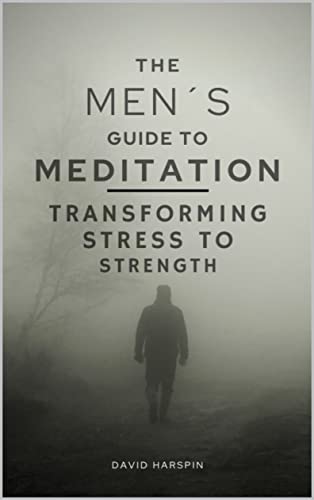Review of the book Men´s guide to meditation
Meditation has become a popular practice for people of all genders and ages looking to reduce stress, improve mental and physical health, and cultivate inner peace. However, many men may feel intimidated or unsure about how to start a meditation practice. This guide will cover the basics of meditation and answer some common questions to help men get started on the path to mindfulness.

How do men start meditating – This is not for Men´s Meditation Retreat but for the Book – that will make you feel like you are on a Retreat.
Getting started with meditation is simple and can be done anywhere, at any time. Here are some steps to help you get started:
- Choose a quiet, comfortable space where you won’t be disturbed.
- Sit comfortably with your back straight, close your eyes, and focus on your breath.
- Begin by taking slow, deep breaths and counting each inhale and exhale.
- If your mind starts to wander, gently bring your focus back to your breath.
- Start with just a few minutes of meditation each day and gradually increase the time as you become more comfortable.
Is meditation good for a man?
Yes, meditation is good for men of all ages and backgrounds. Research has shown that meditation can help reduce stress, improve mental and physical health, boost the immune system, and enhance focus and concentration. Additionally, meditation can help men cultivate a sense of inner peace, improve relationships, and increase overall happiness and well-being.
How long should a man meditate?
The length of time you should meditate each day depends on your personal goals and schedule. For many people, starting with just a few minutes of meditation each day is a good place to begin. You can gradually increase the time as you become more comfortable with the practice. Aim for a consistent daily meditation practice, rather than trying to meditate for long periods just a few times a week.
Do’s and Don’ts of Meditation
Here are some general guidelines to help you get the most out of your meditation practice:
Do:
- Choose a quiet, comfortable space to meditate
- Sit comfortably with your back straight
- Focus on your breath
- Be patient and kind to yourself
- Start with just a few minutes of meditation each day
- Gradually increase the time as you become more comfortable
Don’t:
- Meditate on a full stomach
- Try to force thoughts out of your mind
- Compare your meditation experience to others
- Get discouraged if you have trouble focusing
Is it OK to meditate on bed?
Meditating on a bed can be comfortable and relaxing, but it can also make it more difficult to stay awake and focused during your meditation practice. Additionally, if you associate your bed with sleep, it can be difficult to switch gears and focus on meditation. It’s best to choose a quiet, comfortable space that is specifically designated for meditation, such as a chair or cushion on the floor.
What are the 5 stages of meditation?
There are many different approaches to meditation, but one commonly recognized model of meditation progression includes five stages:
- Relaxation: Relaxing the body and mind to prepare for meditation.
- Concentration: Focusing the mind on a single point of attention, such as the breath.
- Quieting the mind: Letting go of thoughts and distractions to reach a state of deep peace.
- Insight: Developing a deeper understanding of oneself and the world.
- Samadhi: A state of union with the divine or ultimate reality.
How do I know if I meditated correctly?
There is no right or wrong way to meditate, and everyone’s experience is unique. The goal of meditation is not to achieve a certain state, but rather to cultivate a greater awareness and understanding of yourself and the world around you. If you stay focused on your breath and are able to let go of thoughts and distractions, you are likely meditating correctly.
What are the 6 R’s of meditation?
The 6 R’s of meditation refer to a step-by-step process for establishing and maintaining a daily meditation practice:
- Recognize: Recognize the need for a daily meditation practice and the benefits it can bring.
- Reduce: Reduce stress and distractions to create a conducive environment for meditation.
- Remove: Remove negative thoughts and emotions that interfere with meditation.
- Replace: Replace negative thoughts with positive ones to cultivate inner peace.
- Renew: Renew your energy and focus by meditating regularly.
- Rejoice: Rejoice in the benefits of your meditation practice and continue to deepen your practice.
What happens to your brain if you meditate everyday?
Research has shown that regular meditation can have a profound impact on the brain. Some of the benefits of daily meditation include increased gray matter in the brain, improved connectivity between brain regions, enhanced focus and concentration, reduced stress and anxiety, and increased feelings of happiness and well-being. Additionally, daily meditation can help improve sleep quality and boost the immune system.
What are the things you should not do during meditation?
Here are some things to avoid during meditation:
- Don’t try to force thoughts out of your mind.
- Don’t judge yourself or compare your meditation experience to others.
- Don’t get discouraged if you have trouble focusing.
- Don’t meditate on a full stomach.
In conclusion, meditation is a simple yet powerful practice that can help men reduce stress, improve mental and physical health, and cultivate inner peace. By starting with just a few minutes of meditation each day, being patient and kind to yourself, and gradually increasing the time as you become more comfortable, you can begin to experience the benefits of a daily meditation practice.
The book Men´s guide to Meditation – Turn Stress into Strength
I can tell you that meditation is a powerful tool that can help men transform stress into strength by reducing stress and anxiety, improving mental clarity, and cultivating inner peace. Many books and resources are available to help men learn about and start a meditation practice, including guided meditations, tips for overcoming common obstacles, and practical advice for making meditation a part of daily life. Whether you are a beginner or have been practicing for years, a good guide to meditation can provide the support and guidance you need to turn stress into strength and achieve greater well-being.
This book is great for men that wants to start meditating.

